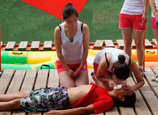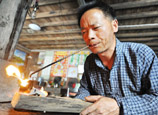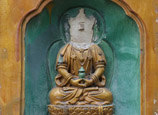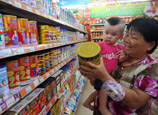
3:30pm
Ready to get out of the downtown for awhile? Baoguo Temple in the north part of the city is a good choice for the first day's schedule. Take a taxi from Tianyige Library, a journey of about 25 minutes. The temple was originally built in the Eastern Han Dynasty (AD 25-220). The current grand hall was renovated in 1013. It is the largest wooden structure in China's Jiangnan region. You won't be able to find a single nail in the hall, which is 11.91 meters long by 13.35 meters wide, because it is put together with the traditional Chinese mortise-and-tenon technique, which reached one of its peaks of development here. Since the temple was renovated many times, it is like a live slide-show of Chinese architectural samples from the Han, Tang, Song, Ming and Qing dynasties and modern times. The green area around the temple is also a good place to catch some fresh air.
7pm
The best place to have dinner on your first day in the city is Tianyi Square, the largest such area downtown. The square combines entertainment, catering, shopping and other businesses.
You can choose from dozens of restaurants on the plaza, including traditional Chinese cuisine, hotpot and some Western-style restaurants. Gangyagou Restaurant is the best place to go for local snacks. The shop's logo features items that spell out the owner's name - a large crock (gang in Chinese), a duck (ya) and a dog (gou). Ningbo tangtuan, or sticky rice ball, xiaolongbao, or steamed damplings and niangao, or sticky rice cakes, are among the most popular dishes.
8:30pm
Stroll around Tianyi Square to discover some interesting boutiques, featuring Chinese dresses, souvenirs and handicrafts. (It's also the place to do some shopping if you have forgotten something. The square is home to many international brands.) Don't miss the musical fountain if you are here on a weekend or holiday night.
Day 2
9am
The second day in Ningbo begins with a trip to Xikou, a town 37 kilometers from downtown and home to the late Kuomintang leader Chiang Kai-shek.
Go through the Wuling gate, one of the symbolic structures in Xikou town, and turn left. You can see the Wenchang Pavilion, former residence of Chiang and his wife, Soong May-ling. This two-story Western-style building covering area of 500 square meters was built in 1930. Standing at the foot of the Wushan Mountain and facing the Shanxi Creek, the house is in a tranquil and beautiful environment. It is said that Soong liked swimming, so a diving platform was designed especially for her at the Shanxi Creek for her summer vacations.
There is a stone tablet in the house that says yi xue xi xue (ò??a?′?a), which means "blood for blood," written by Chiang Ching-kuo, son of Chiang Kai-shek and his first wife, Mao Fumei. Mao, who wed Chiang Kai-shek in an arranged marriage and was divorced when Chiang returned from Japan, was killed at the back lane to nearby Fenggao House in a Japanese aerial bombing on December 12, 1939. To show his bitter hatred for the enemy and his will to avenge his mother's death, Chiang Ching-kuo wrote those four words when he was 29 years old.
10am
Walk back to the Wuling gate and stroll on Wuling Street, paved with bluestone. Along the street, you will first see Fenggao House, the birthplace of Chiang Kai-shek and Chiang Ching-kuo. Covering an area of 4,800 square meters, the house is of typical traditional Chinese style with an antechamber, a chamber at back, two wings and four verandas. The middle chamber of the house is named Baoben Hall, and has the memorial tablets of four generations of Chiang's family back to his great-grandfather. The sculptures and paintings are must-sees in the house. On the beams and the pillars, there are paintings of stories from the "Romance of the Three Kingdoms," a very popular Chinese historical novel depicting the fierce power struggle among warlords before and after the collapse of the Han Dynasty (206 BC-AD 220). The house hosted the wedding ceremonies of both Chiang Kai-shek and Chiang Ching-kuo.
Leaving the house, visit Yutai Salt Shop, where Chiang Kai-shek was born on October 31, 1887. The business, opened in 1871, was run by Chiang's grandfather and sold rice, alcohol and vegetable pancakes. After Chiang became famous, the shop was regarded as a place of fortune and good luck.
Admission to the former residence of Chiang Kai-shek is 120 yuan. It is open from 8am to 5pm.


















 Beijing, Shanghai not listed in top 10 happiest cities in China 2013
Beijing, Shanghai not listed in top 10 happiest cities in China 2013


![]()
